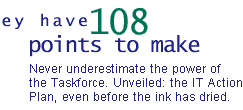


|
|

|
|
| HOME | INFOTECH | HEADLINES | |||
| July 6, 1998 |


Priya Ganapati in Bombay
The Action Plan, which was presented to Prime Minister Atal Bihari Vajpayee by Taskforce Chairman Jaswant Singh, has made 108 recommendations to 'transform India into a global software power by 2008'. Here are a few striking recommendations:
Though, Taskforce Member-Convenor Dr N Seshagiri and Member T H Chowdhary were ecstatic about the achievement of the panel, another member N Vittal preferred caution. "Don't underestimate the power of the babus. An army marches on its stomach. But the government marches on paper," he warned. However, Seshagiri continues to be euphoric. "Many of these recommendations will actually happen in the next 12 months. Wherever we have talked of meeting an export target of $50 billion per annum by 2008 it is surely achievable. Software will then become the primary export from the country. The government, in particular, the honourable prime minister, has enormous political will to implement it. Fifty of our recommendations will come into effect within the next 12 months. Some of our other recommendations may require four to five years, though." Chowdhary, a former chairman of the Videsh Sanchar Nigam Limited, surpassed Seshagiri's optimism. "In a few days, a maximum of 10 days, the respective ministers will approve of the recommendations. In about four to six weeks a gazette notification will become effective. I expect that by 15th August the process should be complete. In fact, Dr Seshagiri, himself, is drafting the notifications on behalf of every ministry so that the process is not delayed unnecessarily." While agreeing with his peers on the panel, Vittal, the chairman of the Public Enterprise Selection Board, told this reporter that "I don't want to create a hype. I don't want to raise expectations too much. Then, when things don't work out people are disappointed. Between the cup and the lip there are many a slip," he warned. Taking the good advice, Rediff attempted to cut through the hype. When asked if the suggestions in the Action Plan would really generate action or did they merely represent the industry's wish list, both Chowdhary and Seshagiri sprung to the defence. Chowdhary explained "We had a committee of secretaries from various departments like commerce, finance, and revenue involved in the process. For example, there were many cases where ministers told us that 'My secretary has agreed so I have no problems'. We had to meet the ministers and convince them that these recommendations would help them as they were populist in nature and then they agreed." Seshagiri had similar things to say. "We considered each and every clause from the angles of pragmatism and achievability. We spoke with the departments concerned like the departments of telecommunications and finance. And only after their approval were the clauses included. For example, when we were discussing the issue of VSNL's monopoly, the entire taskforce met the secretary of DoT and explained the kind of missed opportunities in the country because of this. We then had a meeting with Minister of Communications Sushma Swarajji, who was also extremely progressive." But Vittal said it all when he summed up the situation with "It isn't over till it's all over. Let us not forget the eternal battle between the commerce and the finance ministry, especially over customs." Working on the premise that only dreamers become doers, Rediff, went on to poll the experts on how the Action Plan would impact the lives of the ordinary citizen. Chowdhary admitted that the recommendations would not immediately make a difference to the average Indian. But a quick justification followed: "The effect can be seen a little later. Right now, we are looking at how it can affect me as a professional. We are looking at the constraints, restrictions, high costs, permit license quotas and the inspector raj and working to see if we can remove that. For example, if we look at the setting up of a software company, anti-environmental pollution permit is required. For that, you have to bribe an inspector. This cannot continue."
W "For example, under the initiative of the PMO (Prime Minister's Office), a pilot project called Warana Nagar Wired Villages will be completed in three months. After that, horizontal transfer of technology to other surrounding villages will take place. Also, putting in IP (Internet protocol) over ATM (asynchronous transfer mode), which is a huge international project, will have India contributing to it. We will make sure that all traffic in the region will then go through India." Chowdhary chucked the blueprint and took up the flesh and blood reality that every good policy cannot lose sight of. "Suppose we are to export $30 billion of software we would then require a million professionals. Now, where are they going to come from? As a part of our long-term policy, we are going to look at computer literacy. We will make sure that every village and taluka has computer literate professionals. "We are also looking at setting up of universities. But universities need teachers. If I am a computer professional, I have to make an easy choice between a Rs 15,000 per month teaching job and a Rs 50,000 per month job in the industry. We plan to suggest a way by which computer professionals can hold two jobs and teach while they work elsewhere." And again, Vittal has the last word. "Whenever we talk of the future, the issue of policy comes up. We keep talking of India as the IT superpower but what is essential is action." Reference: |
|
HOME |
NEWS |
BUSINESS |
CRICKET |
MOVIES |
CHAT
INFOTECH | TRAVEL | LIFE/STYLE | FREEDOM | FEEDBACK |
|